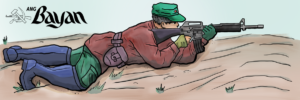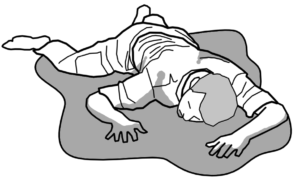The masses’ support to the people’s war is unwavering

“Brothers/sisters and comrades, take whatever you need.” Posted on a hut, the invitation greeted Red fighters of the New People’s Army inside a guerilla zone in North Central Mindanao. They were overjoyed amid the banana trees which surrounded the hut. After having their fill, they cleared the farm from weeds and planted more banana trees.
The invitation was a relief to the comrades who have been dealing with intensified military operations of the Armed Forces of the Philippines for several months. The operation involved troops from at least two battalions with close air support of helicopters and jet fighters. The operations brought terror to the masses, dislocated them from their communities and livelihoods, and destroyed the forests. Throughout this period, Red fighters endured great challenges, including months of food shortages.
As expected, the enemy was unable to sustain such large-scale focused operations. When the situation decelerated, a team of Red fighters was immediately dispatched to link up with the local people.
They encountered abandoned huts and farms, evidence of massive dislocation. It was clear that residents hastily fled their communities. They left behind their things and some jobs were clearly unfinished. Even domesticated animals were left behind.
A few days later, the Red fighters came across the peasant who owned the hut with the bananas. He told the comrades that it has been six years since an NPA unit operated in his area but he still prepared his farm for the comrades should they find themselves there. This deep concern for the comrades’ well-being is the kind of support the NPA receives even in areas battered by militarization.
The organized masses are deeply worried during times of intense operations. Once, a peasant tearfully recounted his sadness, believing in the enemy’s boast that a series of bombings using FA-50 jet fighters wiped out a unit of Red fighters. A week after the incident, he plucked up the courage to visit the site of the bombings. He couldn’t imagine leaving the comrades’ remains to the wild pigs. He was overjoyed when he saw that his beloved Red fighters were all alive and well.
There was also the time when the comrades lost their way and found themselves in a farm owned by brothers who never encountered the people’s army before. In a short time, the comrades explained the revolution and secured the brothers’ support. The brothers did not find it hard to comprehend the cause of the Red fighters as they found themselves talking with fellow farmers who shared similar hardships and problems. Aside from giving immediate support, the younger brother decided to join the people’s army.
These experiences show the masses’ unwavering willingness to support and directly participate in the people’s war.
While the Red army is engaged in intensive war with the enemy, they ensure that the comrades avoid surprise attacks. They readily pass information if they notice tracks or telltale signs of the presence of fascist soldiers. They go on patrols to secure their surroundings.
They ensure that the Red fighters’ health are well taken cared of to maintain their high capacity to fight. They offer their crops and other food as support. They also help in storing food in between operations.
In the midst of enemy attacks on their livelihoods and communities, they continue to wage revolution. They don’t stop in expanding and strengthening their organizations. They avoid the enemy’s indiscriminate and forcible campaign of “surrenders.” If they have been coerced to surrender, they make themselves scarce so that the soldiers cannot use them in combat operations. They carefully hide the things that the people’s army leave to them for safekeeping. Above all, they wholeheartedly allow and support their children to join and stay in the people’s army.
(From Ang Kalihukan, NDF-NCMR revolutionary paper.)



